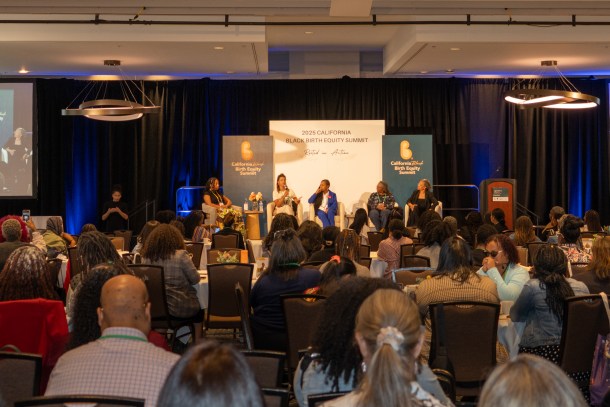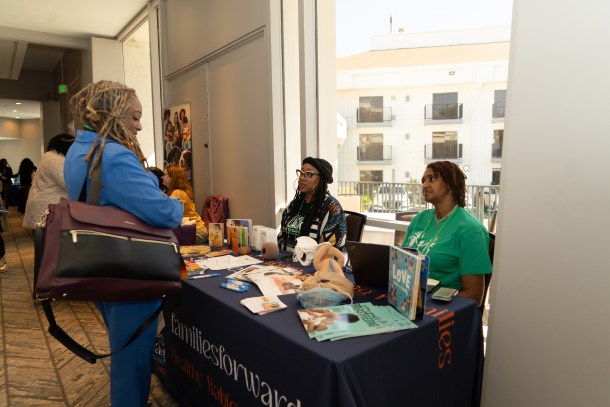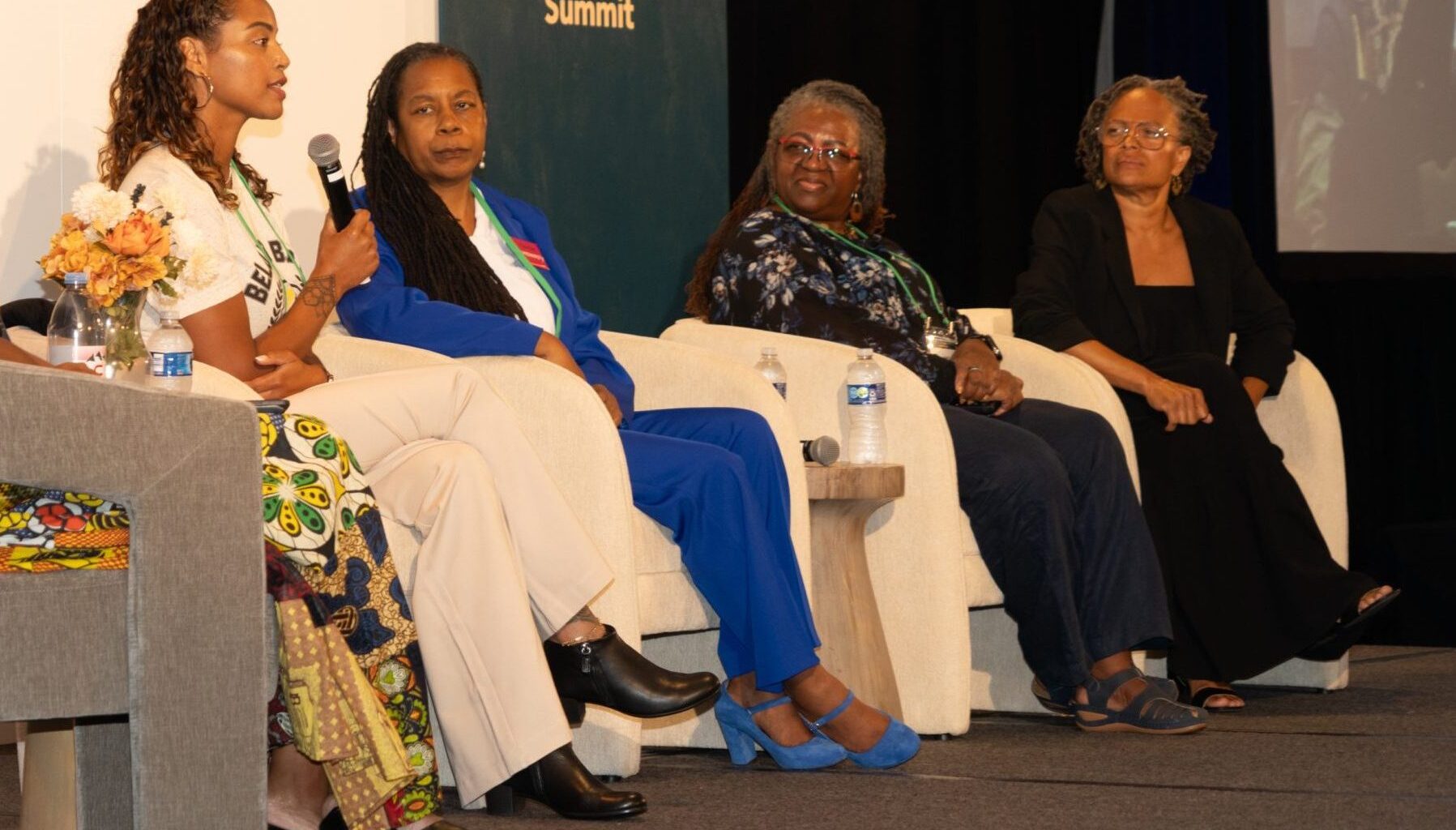California has one of the widest racial gaps in maternal mortality in the country, with Black women three to four times more likely to die than their counterparts.
Change, advocates say, will come not from repeatedly highlighting disparities, but centering Black-led solutions. This was the driving force behind the recent California Black Birth Equity Summit. Held locally at the DoubleTree Hotel, the summit drew clinicians, midwives, doulas, and policymakers.
Event founder Mashariki Kudumu said this year’s theme, “Rooted In Action,” was a direct reflection of the movement to elevate Black leaders and tangible solutions to a crisis that Black women have long known how to solve.
“Our community knows what works for them,” Kudumu said. “What the summit does is it elevates the Black leaders in this work.”
The summit was co-hosted by the California Coalition for Black Birth Justice and the UCSF Center for Birth Justice. The statewide event was held in Sacramento to connect participants with Black birth justice leaders and drive home the importance of engaging with policy stakeholders and lawmakers. Assemblymember Mia Bonta and state Sen. Akilah Weber Pierson, who is also an OB/GYN, were among the guest speakers.
The OBSERVER sat down with Kudumu to discuss the summit and birth equity going into the future. Kudumu was adamant about the importance of building partnerships and collaboration. The Southern California-based advocate points to Gov. Gavin Newsom signing Senate Bill 65, also known as the “Momnibus bill,” in 2021. SB 65 expanded Medi-Cal to cover doula services and extended postpartum care to 12 months.
“That really was community doulas and community partners working together with the Department of Health Care Services and those doulas and community partners advocating,” Kudumu said. “That’s one way we think about how collaboration among many different partners can advance policy.”
Even with advancements in doulas and midwifery acceptance, there’s still work to be done. The Medicaid doula benefit, while increasing access, continues to face challenges with underutilization by Black families, inconsistent reimbursement for Black doulas, and lack of respectful acceptance from some hospitals.
 The second, biannual event was held recently at the DoubleTree Hotel. Roberta Alvarado, OBSERVER
The second, biannual event was held recently at the DoubleTree Hotel. Roberta Alvarado, OBSERVER
Kudumu served on the advisory board for the California Department of Public Health’s 2023 “Centering Black Mothers” report.
“It names racism as the root cause of racial disparities and inequities in maternal health outcomes,” she said of its importance. “The report illustrates how neighborhood conditions, chronic stress caused by racism, and lack of access to high-quality, risk-appropriate care before, during, and after pregnancy have a negative impact on maternal health and birth outcomes.”
The report highlights the importance of non-health care recommendations/solutions to improve Black maternal health, such as increasing access to quality education and employment opportunities; programs, policies, and resources that increase social support and reduce impact of toxic stress; increasing access to community-based care, doulas, and midwives; engagement and power-sharing with Black communities and organizations; and diversifying the health care workforce to increase the number of Black health professionals and clinical providers.
“Policies and initiatives to improve Black maternal health must not rely solely on health care and clinical solutions,” Kudumu said. “The resources and conditions of where Black families live, work, place, pray and go to school have a greater impact on maternal health and birth outcomes than their access to health care and clinical solutions.”
The Coalition for Black Birth Justice launched its own report, “The State of Black Birth Equity in California,” at the summit. The report spoke of the urgency of the matter.
“Following the political shift after the January 2025 inauguration, a wave of harmful executive orders and federal actions — including threats to Medicaid (Medi-Cal in California, which covers 40% of all births), the deliberate dismantling of public health infrastructure, cuts to essential safety-net programs, and a rollback of health equity research — have already begun to harm California families,” it reads. “These actions threaten to further destabilize an already underperforming perinatal system in California that is simultaneously facing provider shortages, hospital closures, and underinvestment in community solutions. These dynamics threaten to reverse progress and deepen inequities in California and across the nation.”
The federal government shutdown also threatens millions of Californians relying on benefits from programs such as the Special Supplemental Nutrition Program for Women, Infants, and Children (WIC).
“We are in curious times,” said Kudumu, who was also an advisor to the State of Black Birth Equity report.
“People feel under attack right now, for a variety of reasons,” she added. “[We’re seeing] reduction of funding for our safety net programs, reduced funding for family planning and reproductive health, as well as attacks on birth equity and health equity initiatives and equity initiatives, period.”
Having an event that was “centered in Blackness” was timely and impactful, Kudumu continued.
“Folks came to the summit and said, ‘This is what I needed to to remind me to keep going.’ Folks left empowered,” she said. “They left encouraged. They left hopeful. They left full of joy because we have to be in this time.”
In addition to guest speakers and breakout workshops, this year’s event also included a wellness component, complete with a massage therapist. Local advocate Dr. Teah Hairston-Johnson offered a session titled, “Rhythms of Restoration: African Drumming and Sonic Healing for Black Perinatal Wellness.” Afterwards Dr. Hairston-Johnson took to social media to share her thoughts.
“My session was uplifting, restorative, powerful/empowering, unifying, decolonizing, full of joy, laughter, and deep soul expression in the form of collective sound and movement,” she posted on Facebook. “All from the mouths of the women in the room after having sat through so many disheartening, yet necessary, conversations about the state of Black maternal health in the U.S.”
Kumundu heard, and felt, the energy of the standing-room-only session from the room next door.
“I wasn’t in the room, but I could hear the drumming, I could hear the affirmation,” Kumundu said. “It was a vibe.”
 LaShanya Breazell of United and Guided visits the table of Alliss Hardy and Shawn Taylor for Families Forward Resource Center at the 2025 California Black Birth Equity Summit. Roberta Alvarado, OBSERVER
LaShanya Breazell of United and Guided visits the table of Alliss Hardy and Shawn Taylor for Families Forward Resource Center at the 2025 California Black Birth Equity Summit. Roberta Alvarado, OBSERVER
It was important to summit organizers for people to feel “poured into,” Kumundu said.
The summit also purposefully centered the voices of those with lived experience, drawing a large contingency of community doulas and peer advocates, such as the MotherBoard of Los Angeles County, who attended with their children.
“It’s important to have ’systems’ in the same room as people that are being impacted, so they see the mamas with their kids advocating, leading our sessions, leading the summit,” Kudumu said. “This is our ’why.’”
The dialogue concluded with a half-day advocacy roundtable at the Capitol, where hosts reinforced the commitment to transforming Black birth outcomes through focused policy and advocacy. The roundtable drew remarks and participation from Kudumu; Secretary of State Dr. Shirley N. Weber; Adjoa Jones, a doula who leads Los Angeles County’s African American Infant/Maternal Mortality Prevention Initiative; Dr. Josephine Appiah of Black Women Organized for Political Action; Onyemma Obiekea, policy director for Black Women for Wellness; Dr. Nomsa Khalfani of Essential Health Access; Assemblymember Dr. Joaquin Arambula; and local epidemiologist Dr. Flojaune Cofer.
Continued focus is key, leaders say. Looking ahead to 2026, Kudumu and others will look at policy recommendations that were discussed during the summit, particularly during Black Maternal Health Week, held in April. Held biannually, the next summit is scheduled for 2027.
“We’re going to stay the course,” Kudumu said, “We’re not going to take our foot off the pedal. We have to keep going despite everything that’s happening. If we don’t, we know that all these cuts and attacks that are happening aren’t leveling the playing field. They’re going to make maternal outcomes worse, not only for Black families, but for everyone.”
Related

